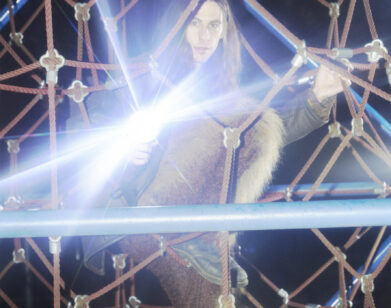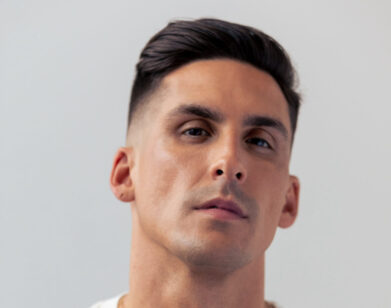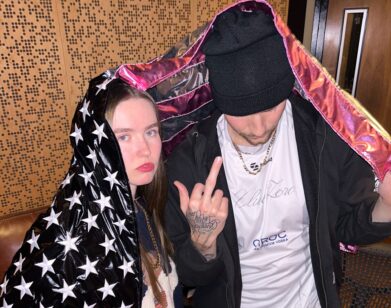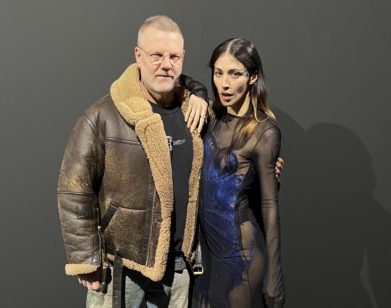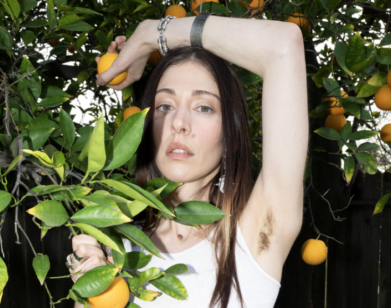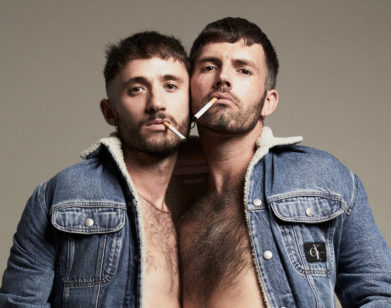Hayden Dunham and Caroline Polachek on the Transformative Power of Pop
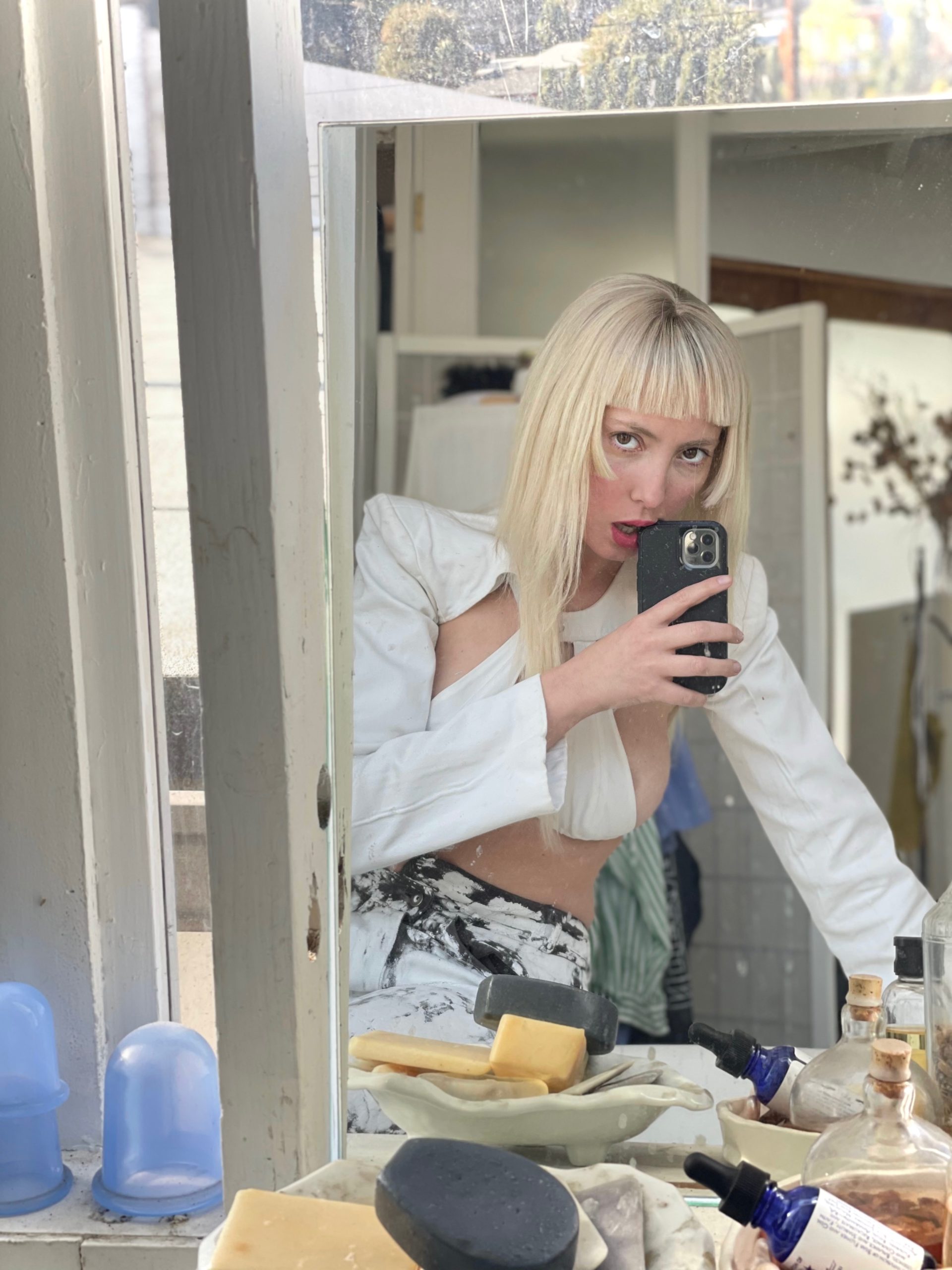
Hayden Dunham is an enigma, liquid in form. Since their 2014 debut as QT, a bubblegum pop avatar she created with PC Music founder A.G. Cook and the late electronic producer SOPHIE, they’ve shape-shifted from performer to fine artist, showing everywhere from MoMA PS1 in New York to Grunenberg Gallery in Berlin. Last month, Dunham, who has suffered from temporary blindness, returned to the spotlight as Hyd, a new project accompanied by a self-titled EP. Produced by Cook, umru, and Caroline Polacheck, Hyd transcends the boundaries of avant-pop, blending earthy beats with ASMR-like lyricism. To mark the album release, Polachek spoke to the 33-year-old producer and performance artist about the Texan heat, spirit genres, and what’s for dessert.
———
CAROLINE POLACHEK: Congrats on your EP release! I was just listening to it before this interview and one thing that really struck me is how this music is so hard and so soft at the same time. Was that something you did intentionally?
HAYDEN DUNHAM: I’m always trying to become softer, but I definitely come from a place of rough-riding and toughing it out. That’s the whole thing about tough guys. There’s a lot of softness that a heavy shell is protecting.
POLACHEK: That state of being tough-guy rough-rider feels really connected to your upbringing in Texas. Can you tell me about that?
DUNHAM: In Texas there’s an absence of water. You can imagine what it was like when the Gulf of Mexico was full and everything was covered. I think about my mouth being dry, it being 100 degrees and sweat pouring down my face. I sweat a lot, that’s the cooling system that my body has advanced to. I can be in really extreme heat and feel really comfortable.
POLACHEK: Earlier I was listening back to track three, “The Look on Your Face,” and I was thinking about how it’s connected to these late ’90s grunge ballads, like “Torn” by Natalie Imbruglia or “Damn I Wish I Was Your Lover” by Sophie B. Hawkins. It’s a real spirit genre for me. It’s tough yet emotional, and simple in a way that feels canon—very American songbook. You sing with the same accent that you speak with. It has this American truth to it, which is very special and really feels to me like a part of the grunge ballad legacy. I’m curious about the music that Hyd loves, the songs that you love that are a part of Hyd’s inner songbook, and the influence they might have had on your writing.
DUNHAM: Caroline, you nailed it. You are so good. I feel like you just looked into my 13-year-old self and gave me a hug. I think about that time and I think about bands like Sixpence None the Richer and the song “Kiss Me.” I remember listening to the radio in my bed, and just waiting for that song to come on and feeling like within that song, I could feel what it would be like to feel loved. My life at that time was really different. I grew up on country music, religious music, and pop music. There’s this thing about cowboys and how country music is a safe space for them to experience emotion. Otherwise, if you’re a cowboy and you feel something you have to go off into the pasture and cry or experience whatever it is, but you don’t show it in front of other people. That’s part of the language that I grew up with. Pop music was this extremely emotionally rich landscape where I could feel things beyond what was accessible to me at the time. Listening to Enya, listening to The Cranberries, listening to pop music on the radio. It was a whole communication system that I wanted to learn about. I would study it and listen to it and memorize lyrics, almost like poems to recite. At some point in middle school, I realized that I could communicate with other people by playing a song for them. Like, if you have a crush on someone, you can play them a ballad or Mandy Moore’s “I’ve Got a Crush on You.”
POLACHEK: When was the first time that you opened yourself up to being in a room with someone else and making something together musically?
DUNHAM: It must have been 2012 or 2013, not long after Sophie and I started dating. We were at my dad’s house in Texas and she was working on this song, “VYZEE.” When I heard it originally, she had the lyric, “Crazy in the park.” I said, “what if it’s, ‘Crazy in the pop?’” She really liked that idea. At the time I was making these very largescale sculptures. I worked with a lot of different types of liquid: liquid exploding, liquid turning from a solid to a vapor state. I was making these fountains and wanted there to be a sonic element that traveled through the water to make it gyrate and shake and move and expand. She was really excited about that, and that was how we communicated. I would present a material and then she would respond with a sound, and that led to an entire sonic world and many years of collaborating. We developed a communication system together that still continues to this day, beyond space and time.
POLACHEK: Hyd is such a bodied entity and yet, does Hyd eat? Does Hyd like to survive on the air and gasoline? I mean, possibly, but if Hyd invites you over for dinner, what are you going to get fed?
DUNHAM: Live flames are a must. The main course already exists inside of your stomach. You don’t eat it through your mouth, you inhale it through your skin. It’s something that you feel, but that you don’t smell or taste. It just is. Dessert is, as you know, my favorite part. The last course is one that starts in your eyelashes. It’s a cold feeling that moves its way into your nervous system, and then it goes down into your heart. The cold feels really good, but when it gets to your heart, it gets really, really hot.
POLACHEK: Everything you were just talking about, everything that’s being served at Hyd’s table, feels so related to your sculpture. It’s like an elemental language to describe inner potential and transformation. Is that something that you think about planting in your music? Does it inform it in any way?
DUNHAM: The thing about pop music is that it’s a transformer. You can listen to a pop song and completely change how you feel within the space that you’re in, how you communicate within that space, and how you show up for other people there. For me, pop music and pop writing is an invitation to create and imagine new systems that we can live inside, that we can share and expand into. It’s something that I need.
POLACHEK: Can you open your phone and find your last selfie for me and describe it as poetically as possible?
DUNHAM: All right, I’m going into my albums. I’m going into selfies, that is the category. I know because I’ve seen it before. Okay, my last selfie. I am wearing a chartreuse shirt that has rocks sewn into the back of it. It’s a grounding device. It looks like my hair is wet, but actually it’s just not washed. I kind of look like a snake. I look slinky and like I might slip away from the page. Slip and slide-y, if you will.
POLACHEK: I have one last question for you which is one that seems so essential to the Hyd project, and also my involvement. What’s your philosophy for building a collaborative team?
DUNHAM: I love this question. So much of it has to do with energy and just energetically matching up, holding an intention, and meeting another person who holds that same intention—or an intention that aligns. This type of alchemy and chemistry is really exciting to me, and so much of my work has been informed through these dialogues. Obviously the dialogue that you and I have been having since I was 17 is one that is incredibly influential. Getting to have conversations with people that I admire expands my world. I’m in a session with Hannah Diamond and Alex Somers right now. It’s out of a story, a fairy tale, basically. There’s a cool bergamot-flavored mist filtering throughout the studios. It’s really beautiful to witness.

